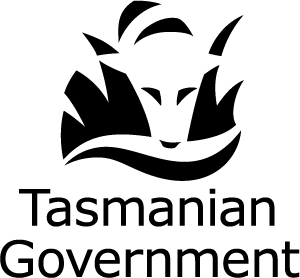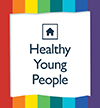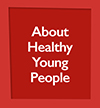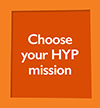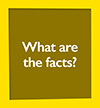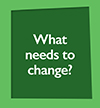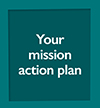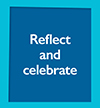Information and services
Whether you are a young person, teacher or health worker this section has lots of great resources to answer your health and wellbeing questions.
Healthy Kids Toolkit
The Healthy Kids Toolkit is a Tasmanian Government resource developed by Public Health Services. The Healthy Kids Toolkit is a hub of information to support the health of children and young people. Check out the Young People section for fact sheets, resources and other information on the HYP Missions.
Glossary
Want to know what a word or a phrase means? Want to know how to explain something?
Our glossary will help you understand your HYP Mission.
Term | Definition |
|---|---|
Active Transport | Active transport is physical activity undertaken as a means of transport, for example walking, running, cycling, rollerblading and scooting to get somewhere. |
Adolescence sleep phase delay | Sleep is regulated by two body systems: the sleep/wake homeostasis and the circadian biological clock (or internal body clock). In late puberty, a young person’s body tends to secrete the sleep hormone melatonin later in the day than in younger children. This can cause some young people difficulty in getting to sleep and waking up. The further you push your bedtime late into the night (past 11-11.30pm), the more you disrupt the internal body clock. Through time management and good sleep habits (sleep hygiene) the body can be cued or trained for sleepiness. |
Anxiety | Anxiety is more than just feeling stressed or worried. While stress and anxious feelings are a common response to a situation where a person feels under pressure, it usually passes once the stressful situation has passed, or ‘stressor’ is removed. Anxiety is when these anxious feelings don't subside. Anxiety is when they are ongoing and exist without any particular reason or cause. It’s a serious condition that makes it hard for a person to cope with daily life. We all feel anxious from time to time but for a person experiencing anxiety, these feelings cannot be easily controlled. |
Body bullying | Body bullying is criticising or speaking negatively about someone’s body, body parts, looks, shape or size. Body bullying is never okay. |
Body diversity | Body diversity is the differences in physical appearance between individuals. These differences include:
|
Body dissatisfaction | Body dissatisfaction is having negative thoughts and feelings about your body. |
Body image | Body image is the perception a person has of their physical self and the thoughts and feelings the person experiences as a result of that perception. It’s the mental picture a person has of their body – and how comfortable the person is with that mental picture. Body image is influenced by a person’s perception and judgement of their size, shape, weight and other aspects of how they look, and their belief about how others see their body. |
Body preoccupation | Body preoccupation is a persistent worry or concern about your body shape, weight or appearance. |
Chronic conditions or diseases | Chronic conditions or diseases are complex health conditions that affect people for long periods of time and are generally incurable or hard to cure. Common chronic diseases include diabetes, heart disease, lung disease, cardio-vascular disease, cancer, and arthritis. Many chronic conditions can be prevented or managed through healthy choices, including eating well, being physically active and limiting sitting time. |
Circadian biological clock or internal body clock | Humans have an internal body clock that roughly follows a 24-hour cycle called the circadian biological clock. This internal body clock guides the sleep/wake cycle and tells us when it’s time to go to sleep and when it’s time to wake up. |
Cortisol | Cortisolis known as the stress hormone. When you are stressed or afraid your body secretes more cortisol. This has many effects on your body, including making it harder to get to sleep and stay asleep. Poor sleep can then cause more stress and keep your cortisol levels high. Find ways to relax and manage stress to avoid this unhelpful cycle. |
Dehydrated | Being dehydrated means your body doesn’t have enough water in it. It happens when the amount of water taken in is not enough to replace water lost, including from breathing, sweating and going to the toilet. You can tell if you are getting dehydrated because you will feel thirsty, your urine will darken in colour and you may have a headache and dry skin. |
Depression | We all feel sad, moody or low from time to time but if these feelings continue intensely, for long periods of time (weeks, months or even years) without any apparent reason, it may be a sign of depression. Depression is a serious illness that has an impact on both physical and mental health. |
Devices (and screens) | In the HYP Sleep Mission, devices and screens include computers, Xboxes, iPads, iPods, mobile phones, televisions and similar items. |
Disordered eating | Disordered eating involves an unhealthy relationship with food. When a person regularly engages in unhealthy, ineffective, destructive and potentially dangerous eating behaviours such as restrictive dieting, fasting, skipping meals, compulsive eating, binge eating and unbalanced eating (like restricting a major food group) to lose weight. Disordered eating can be destructive to a person’s life. |
Eating disorder | An eating disorder is a severe and life-threatening mental illness. It is not a lifestyle choice. Eating disorders include bulimia nervosa and anorexia nervosa. Disordered eating is a significant risk factor for the development of an eating disorder. |
Ethnicity | Ethnicity is a characteristic of a group of people that generally has a common ancestry, area of origin (for example, which part of the world they or their ancestors originally came from), language and traditions. Sometimes people guess ethnicity by the way people look, including their skin colour, hair type, facial features and body shape. Be careful making assumptions about ethnicity, and always respect difference between ethnic groups. |
Everyday foods | ‘Everyday’ foods are the foods that should make up the majority of what we eat. ‘Everyday’ foods are grouped into the five food groups:
Enjoying a variety of ‘everyday’ foods every day will help you get all the nutrients you need for good health, to prevent illness and to give you plenty of energy to be active and learn. |
Fat talk | ‘Fat talk’ is when a person talks negatively about their body or other people’s bodies. This is a form of body shaming and contributes to body dissatisfaction. |
Ghrelin | Ghrelin is a hormone that sends messages to your brain signalling you are hungry, and it is time to eat. It works alongside the hormone leptin, which signals feelings of fullness. |
Health | Health is a state of complete physical, mental and social well-being and not merely the absence of disease or infirmity (World Health Organisation). |
Health Literacy | Health literacy is the knowledge and skills needed to find, understand and use information and services to make decisions about health and healthcare. |
Healthy eating | Healthy eating broadly refers to an eating pattern that promotes optimal health and supports growth and development. This includes enjoying a variety of nutritious food every day. In Australia, the Dietary Guidelines for Children and Adolescents (2013) set out recommendations for the amount and kinds of foods that young people need to eat for health and wellbeing. |
Healthy weight | A healthy weight is one the body naturally reaches when you eat a balanced diet and move regularly in a way you enjoy. |
Hydrated | When your body is hydrated, this means it has enough water to function normally. To be well hydrated, you need to balance the amount of water (and other fluids) going into and coming out of your body (e.g. through sweat), this can vary depending on the weather and activity. |
Hormones | Hormones are chemical substances in your body that act like messengers. They help control how your cells and organs do their work. |
Immune system | The immune system is made up of special cells and chemicals that fight infection from bacteria and viruses. |
Incidental Exercise/Physical Activity | Incidental physical activity is unstructured activity taken during the day, such as walking for transport, housework and the performance of activities of daily living. |
Insomnia | Insomnia means difficulty with either falling or staying asleep. |
Jetlag | Jetlag happens when your internal body clock gets seriously disrupted and needs to adjust to a new sleep and wake time, often from crossing international time zones. Jetlag can last a few days and can include problems such as difficulty sleeping, extreme tiredness, headaches, anxiety, irritability, dehydration, forgetfulness and stomach problems. Irregular sleep and wake times can cause a form of jetlag called social jetlag. |
Leptin | Leptin is a hormone that sends messages to the brain triggering feelings of fullness. Alongside the ‘hunger hormone’ ghrelin, it plays an important role in maintaining weight. |
Melatonin | Melatonin is a hormone that is involved in falling asleep. In late puberty, a young person’s body tends to secrete melatonin later than in younger children. This can delay young people feeling sleepy and they stay up too late. This can move the timing of a person’s internal body clock. Bright lights (including from screens) reduce the amount of melatonin you produce and can make you less sleepy than being in a dimly lit room. |
Mental health and wellbeing | Mental health is a positive concept that is about wellness rather than illness. It relates to feeling resilient, enjoying life and being able to connect with others. Mental health can be built and maintained through positive relationships and connections to community, cultural identity, physical activity, eating a variety of everyday foods, creative expression, sense of purpose, economic security and availability of opportunities. |
Mental ill-health | Mental ill-health is a broad term that includes both mental illness and mental health problems. A mental illness is a disorder diagnosed by a medical professional that significantly interferes with a person’s cognitive, emotional or social abilities. Examples include depression, anxiety, schizophrenia and eating disorders. A mental health problem can reduce a person’s cognitive, emotional and social abilities, but not to the extent that it meets the criteria for a mental illness diagnosis. These problems can result from life stressors, and often resolve with time or when the individual’s situation changes. |
Metabolism | Metabolism is a number of chemical reactions that take place in the cells of your body. These reactions convert the energy in the food we eat into energy to power everything we do from thinking to growing and moving. Thousands of metabolic reactions happen in your body to keep you alive and your cells healthy and working. |
Micro-sleeps | Micro sleeps are short periods of sleep between a few seconds and 30 seconds. When you have a micro sleep, your eye lids might get droopy and your head might nod. It might happen while you are sitting at your desk or travelling to/from school if you are not getting enough sleep. Often people are not aware they are having or have had a micro sleep. This can be very dangerous if you are driving or operating machinery. |
Naps | Napping is different from a Micro Sleep because it is a longer sleep phase. Animals generally don’t sleep for one long stretch of time. Animals are all ‘multi-phasic’, meaning they have many phases of sleep in a 24-hour period. Because of our modern lifestyles, humans are the only animals that try to get through a 24-hour day with just one phase of sleep (we usually sleep once for a long period at night in the 24-hour clock). Evidence suggest that humans lean towards sleep two phases if given the opportunity: one long period at night, and a short period in the middle of the day. For many people, taking a brief nap can provide the needed energy to perform fully for the rest of the day. |
Norms/Social norms | Social norms are the generally accepted customs or informal rules that govern behaviour in society and within groups. Social norms are powerful at influencing behaviour, and often develop gradually as new ways of doing things or behaving become the norm within a group. |
Obesity/obese and overweight | Overweight and obesity are cut off points of Body Mass Index (which is weight/ height2 inkg/m2), they are associated with increased risk of some chronic diseases at a population level. The World Health Organisation (2014) defines overweight as having a body mass index (BMI) of greater than 25 kg/m2, and obesity as having a BMI greater than 30 kg/m2. |
Organised Sport | Sport is an activity involving physical exertion, skill and/or hand-eye coordination as the primary focus of the activity, with elements of competition where rules and patterns of behaviour governing the activity exist formally through organisations (ABS, 2008). |
Physiological | Physiological relates to the normal, healthy way your body and its organs work. |
Physical activity | Physical activity is any activity that gets your body moving, makes you breathe quicker and your heart beat faster. You can be physically active in many ways and at different levels of intensity.
|
Risk-taking behaviour | Risk-taking is engaging in activities that have the potential to result in harm to oneself or others. |
Role model | A role model is a person who serves as an example of the values, attitudes and behaviours associated with a role. For example, a teacher can be a role model for young people becoming adults in our community. |
Sedentary behaviour and sedentary time | Sedentary behaviour is sitting or lying down (except for when you are sleeping). You can be sedentary at work, at school, at home, when travelling or during leisure time. Sedentary behaviour requires little energy expenditure |
Screen time | Screen time is any time spent in front of electronic screens, including: watching television or DVDs, using computers, lap tops, electronic notepads, iPads, iPods, mobile phones and other mobile devices. Long periods of recreational screen time can affect how much sleep young people get. The light from screens can also delay your body’s secretion of the sleep hormone melatonin. |
Sleep hygiene | Sleep hygiene is a formal term for good sleep habits. These are the things you can do to give yourself the best chance of good refreshing sleep. |
Social jetlag | Social jetlag is the feeling of being very tired when you return to school or work after a late night, weekend or holiday because of changes to your regular sleep/wake times. |
Sometimes foods | ‘Sometimes’ foods are foods that don’t fit into the five ‘everyday’ food groups. These foods are generally high in sugar, saturated fat, and/or sodium and are low in nutrients, so are not needed for good health. Examples of sometimes foods includes sweet drinks, fruit juice, chips, lollies, cakes, pastries, biscuits and chocolate. Choose these foods only sometimes and in small amounts. |
Strength activities | Strength activities improve bone and muscle strength and include skipping, running, yoga, jumping, push-ups, sit-ups, lifting weights, lunges, squats, climbing trees or swinging on monkey bars. |
Suprachiasmatic nucleus | The suprachiasmatic nucleus (SCN) is in a region of the brain called the hypothalamus and contains a group of nerve cells (neurons) that control your internal body clock. The internal body clock controls many physiological and behavioural rhythms, including the sleep/wake cycle. The SCN is highly influenced by light that enters the eyes then travels along the optic nerve to the SCN. |
Self-esteem | Self-esteem is your opinion of yourself and your abilities. |
Stereotype | A widely held but usually exaggerated and oversimplified generalisation used to describe a type of person or group. |
Sweet drinks | Sweet drinks include fruit drinks and juices, soft drinks, artificially sweetened or low-calorie soft drinks, flavoured mineral waters, iced tea, flavoured milk, sports drinks and ‘energy’ drinks. Sweet drinks are ‘sometimes’ drinks. They contain large amounts of sugar (or artificial sugar) and have little nutritional value. Sweet drinks can cause harm to your health and teeth over time. |
Yo-yo sleeping | This is a term used to describe under-sleeping from Sunday to Thursday and then catching up on sleep on Friday and Saturday nights. |
More Health and Wellbeing Information
Website | Details |
|---|---|
AusPlay is a national survey that tracks Australian’s participation in physical activity. Check out how Australians are getting active and what sports are popular with whom. | |
The Australian Centre for Education in Sleep (ACES) aims to provide education on everything to do with sleep and help children and young people be the best they can. Check out this website for sleep research, facts, fact sheets and education materials. | |
Published by the Department of Health Australia, the guidelines provide recommendations about physical activity, sedentary behaviour including ‘recreational screen time’ and sleep. Check out what is recommended for young people and get tips on how to be more physically active, get enough sleep and reduce sedentary behaviour and screen time. | |
This Victorian Government website contains reliable information blog post and podcasts related to all the HYP Missions. Check out the search function or the ‘healthy living’ menu to find what you are looking for. | |
Beyond Blue aims to provide Australians with the knowledge needed to protect their mental health and support others around them. Check out the Youth Beyond Blue website for immediate support, mental health information and forums. | |
The Butterfly Foundation for Eating Disorders provides information and support to people affected by eating disorders and negative body image. They also run campaigns such as Plate up the Positives and Love Your Body Week to support body acceptance, body confidence and to celebrate diversity. Check out the website for information, personal support and ways to support positive body image. | |
DAA is the professional association for dietitians and includes nutrition information, recipes and tips to help you eat well. Check out this website for fact sheets, a healthy eating quiz and to find local support. | |
See Eat for Health for the Australian Dietary Guidelines. These give recommendations about the amount and types of foods that we need to eat for good health and wellbeing. Check out this website for a summary of the Guidelines, advice on eating well, recipes and a food balance online game. | |
Eating Disorders Victoria is an organisation that aims to provide support and advocacy around the prevention and treatment of eating disorders. Check out this website for access to support groups and events, fact sheets and an online bookshop. | |
Eat Well Tasmanian champions healthy eating and promotes opportunities to eat healthy Tasmanian grown, produced and value-added food. Check out this website for information on what foods are in season, recipes and posters. | |
Get Moving Tasmania is a Tasmanian government initiative to support Tasmanians to move more and sit less. Check out this website for a physical activity events calendar, tips to move more and sit less and evidence around the importance of movement. | |
Head to Health provides mental health and wellbeing information, resources and services. Check out this website for information on promoting good mental health, managing mental health difficulties or supporting people with mental health difficulties and links to service providers. | |
Headspace is a youth mental health organisation that focuses on early intervention. They provide information and support relating to mental health, physical health (including sexual health), alcohol and other drugs and work and study support. Check out the website to find your local Headspace centre or find information and tips on common issues. | |
Healthdirect Australia is a national, government-owned, not-for-profit organisation providing general health advice, medication information and a service directory. Check out this website to find health information, health services or check symptoms. | |
The Healthy Kids website aims to support teachers, parents, carers, coaches, health professionals, kids and teens to make healthy choices by providing information about healthy eating and physical activity. Check out this website for tips to get active, recipes and information on Australian health trends. | |
| Healthy Lunch Box was developed by the Cancer Council NSW and OUTRUN CANCER with the goal of eliminating the 1 in 3 cancers that can be prevented with a healthy lifestyle. Check out this website for an interactive lunchbox builder, recipes and time-saving tips. |
Healthy Sleep is an American resource from the Division of Sleep Medicine at Harvard Medical School and WGBH Educational Foundation. Check out this site for information on the importance of sleep, the science of sleep and tips for getting better sleep. | |
The Healthy Tasmania Portal provides Tasmanians and their communities the information and tools needed to make positive and healthy changes to their lives. Check out this website for links to resources on a range of topics, including eating well, moving more, being a healthy weight and being smoke-free. | |
The Heart Foundation has the goal of making it easier for all Australians to live heart-healthy lives. Check out the ‘healthy living’ and ‘active living’ links for information on getting active and eating well to prevent heart disease. | |
Kidney Health Australia promotes good kidney health through education, advocacy, research and support. Check out this site for information on why drinking water is important for your kidney health. | |
Nutrition Australia is a not-for-profit organisation that aims to promote the health and wellbeing of all Australians. Check out this website for healthy recipes, fact sheets and resources around healthy eating. | |
ReachOut is an Australian mental health organisation for young people and their parents. Check out this website for support, information and advice to help young people cope with a range of issues. | |
The Sleep Health Foundation aims to improve people’s lives through better sleep. Check out this website for fact sheets, practical strategies to get better sleep and information on sleep awareness events. | |
Sport Australia is Australia’s primary national sports administration and advisory agency. They are focussed on getting more Australians participating and excelling in sport. Check out this website for tips on getting active, information on sports nutrition, and resources to support schools to help young people be active. | |
Take Action promotes young people to participate in advocacy around important issues such as education, employment and affordable housing. Check out this website for information advice on how to advocate to government. | |
The Tasmanian School Canteen Association (TSCA) is a not for profit, organisation that supports the Tasmanian school community by promoting healthier choices for students in canteens and other food services at school. Check out this website for information on the whole school approach, getting your canteen accredited, recipes and more. | |
The World Health Organisation (WHO) is part of the United Nations Development Group. They provide global leadership on public health issues. Check out this website for global health data and information. |
Youth Services
Need to get personal health and wellbeing advice? Find your local Youth Health Service for free, flexible and confidential information, education, support, referral, and counselling.
